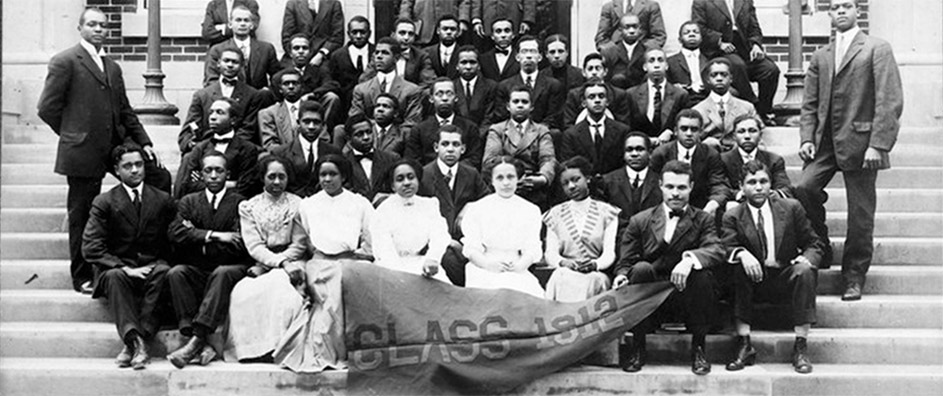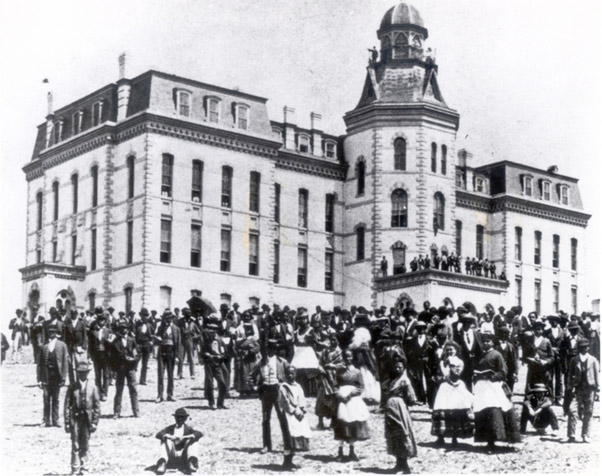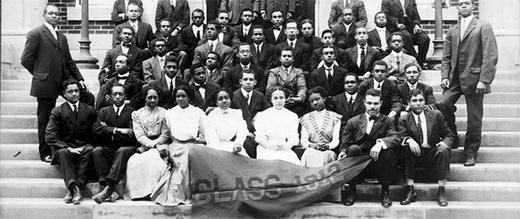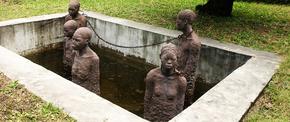The views expressed in our content reflect individual perspectives and do not represent the official views of the Baha'i Faith.
 In 1912, Abdu’l-Baha traveled across the United States speaking about the Baha’i teachings, and spent 11 days in Canada as well. He spoke to packed audiences in auditoriums and in private gatherings as well.
In 1912, Abdu’l-Baha traveled across the United States speaking about the Baha’i teachings, and spent 11 days in Canada as well. He spoke to packed audiences in auditoriums and in private gatherings as well.
Although he talked on a wide range of topics, he emphasized the issue of interracial harmony. Whenever Abdu’l-Baha spoke to predominantly African American audiences, he addressed the descendants of former slaves, the memories of slavery in their families still vivid, haunting and searing.
So what did Abdu’l-Baha say to these descendants of former slaves? What did he say to the whites in the audience, some likely descendants of former slave masters, who broke Jim Crow social mores of total racial segregation to even attend an integrated event? What was Abdu’l-Baha’s discourse like? What language did he use? Was it racially referenced? If so, was such racially-nuanced language positive?
In Part IV of this series, Abdu’l-Baha talked about the former slave Isfandiyar, recalling how Abdu’l-Baha’s own father, Baha’u’llah, wrote: “If a believer in God prays for piety, it does not matter whether he is robed in black or white.”
Also, while in London, Abdu’l-Baha recalled another statement by Baha’u’llah: “Baha’u’llah once compared the coloured people to the black pupil of the eye surrounded by the white. In this black pupil you see the reflection of that which is before it, and through it the light of the Spirit shines forth.”
So we already know that Baha’u’llah used racially positive speech. The purpose of speech, after all, is to influence action. What kind of action was associated with this revolutionary racial discourse?
In his historic speech at all-black Howard University, on April 23, 1912, Abdu’l-Baha spoke of Abraham Lincoln’s Emancipation Proclamation:
The first proclamation of emancipation for the blacks was made by the whites of America. … Then it spread to other places. … [Y]our emancipation led to their freedom also — that is, the European states emulated the Americans, and the emancipation proclamation became universal. … Were it not for this effort, universal emancipation would not have been proclaimed. – Promulgation of Universal Peace, p. 45.
Here, “first” really means “first and foremost.” History partly corroborates, but partly complicates this statement. But Abdu’l-Baha spoke in 1912 as a social reformer, not as a historian. History was the medium of the message, which can best be described as “interracial emancipation.”
Abdu’l-Baha came to North America in 1912 to bring about that “interracial emancipation,” the concept that one race could achieve freedom only when all did. As son, successor and spokesman of Baha’u’llah, Abdu’l-Baha proclaimed the progressive Baha’i principles of ideal race relations (including interracial marriage), gender equality, and world peace:
I am here in this country making an appeal on behalf of universal peace, unity, love and brotherhood,” Abdu’l-Baha told a journalist. “The Bahaist [sic] must be free from religious prejudice, patriotic prejudice, racial prejudice.”
These were radical teachings during the Jim Crow era of forced racial segregation, and the black intelligentsia took notice.
In his Howard University speech Abdu’l-Baha spoke of a new interracial agenda, whereby all European Americans should endeavor to work for the advancement of African Americans. Abdu’l-Baha’s speech pointed out that while the Civil War achieved emancipation from slavery as a result of the sacrifice of much blood and treasure, racial equality and black rights had yet to be truly won.
 Abdu’l-Baha implied that those black rights, which legislation alone could never ensure, would be coefficient with racial equality, requiring a reorientation and transformation of how the races view one another. The whites, Abdu’l-Baha said to the black Howard audience, should “endeavor to promote your advancement and enhance your honor.”
Abdu’l-Baha implied that those black rights, which legislation alone could never ensure, would be coefficient with racial equality, requiring a reorientation and transformation of how the races view one another. The whites, Abdu’l-Baha said to the black Howard audience, should “endeavor to promote your advancement and enhance your honor.”
Abdu’l-Baha’s message of interracial harmony outdistanced even the most liberal of abolitionists, and, during the Jim Crow era of American apartheid, not only represented a progressive, but a socially radical viewpoint.
The very next day after the Howard University speech, on April 24, 1912, Abdu’l-Baha spoke to a private interracial gathering:
A meeting such as this seems like a beautiful cluster of precious jewels—pearls, rubies, diamonds, sapphires. It is a source of joy and delight. … In the clustered jewels of the races may the blacks be as sapphires and rubies and the whites as diamonds and pearls. – Promulgation of Universal Peace, pp. 56-57.
This soaring, healing rhetoric, then and now, has a very real purpose: interracial emancipation, which includes freedom from the psychological, as well as social bondage, of racism — the present-day legacy of past slavery.

















Comments
Sign in or create an account
Continue with Facebookor